
|

|

|
|
|
An up close and personal interview with U.S. Navy Veteran and Togetherweserved.com Member:
HM1 Steven Johnson U.S. Navy (Ret) (1983-2003)
PLEASE DESCRIBE WHO OR WHAT INFLUENCED YOUR DECISION TO JOIN THE NAVY?
I am 52 years old now. When I joined the Navy I was 23 years old. The small town I lived in at the time did not have a lot to offer by way of way of a future, income, and benefits to support a future family. I had not
 |
| Seaman Recruit Steven E. Barnard (Johnson) |
been married for long but my former spouse was pregnant. I had an off and on contract job at the time but I wanted something more for me, my wife, and son to be. The only occupation that offered this in my hometown was the military. After giving it much thought and speaking with my martial arts instructor, who was like a father-figure, he advised me to go to the recruiting station, take the ASVAB, and see what happens.So, I did just that. There is a lot more to my story but the bottom line is...I failed the ASVAB. Yep! Due to my family, country, redneck background, education was not emphasized as being important. Needless to say I was disappointed and felt majorly stupid. Well, based on the needs of the Navy I received a call from my recruiter about two weeks post test asking me if I still wanted "in." I said "yes" and the rest is history. I went to boot camp in San Diego with a guaranteed "A" school upon graduation to Navy Corps School, also in San Diego.
WHETHER YOU WERE IN THE SERVICE FOR SEVERAL YEARS OR AS A CAREER, PLEASE DESCRIBE THE DIRECTION OR PATH YOU TOOK. WHAT WAS YOUR REASON FOR LEAVING?
 |
| NUMI Graduation Photo (1991) |
After basic training: Naval Hospital Corps "A" School, San Diego, California to Advanced Hospital Corps "C" School at the Naval Undersea Medical Institute located in New London, Groton, Connecticut. The attached is a photo of my graduation class from the Naval Undersea Medical Institute (NUMI).
IF YOU PARTICIPATED IN ANY MILITARY OPERATIONS, INCLUDING COMBAT, HUMANITARIAN AND PEACEKEEPING OPERATIONS, PLEASE DESCRIBE THOSE WHICH WERE THE MOST SIGNIFICANT TO YOU AND, IF LIFE-CHANGING, IN WHAT WAY.
USS Nimitz CVN-68 called to battle stations. On 14 June 1985, two Lebanese gunmen hijacked TWA Flight 847, which carried 153 passengers and crew and included Americans. In response, Nimitz was deployed to the coast of Lebanon, where she remained until August 1985. The embarked Airwing 8 flew continuous sorties
 |
| Measuring pupulary distance for lenses. (East Timor) |
for 67 days, bombing several sites in Beirut including the runways of Beirut Rafic Hariri International Airport. The ship returned to Norfolk on 4 October 1985. I was assigned as the lead Flight Deck Corpsman during battle station operations. Without conducting a Google search I think the Ayatollah Khomeini was the reigning leader during that time. Below is an article where I was assigned to a militia war-torn humanitarian response with the Joint Forces Command. Submarine Group SEVEN.
Sailor, Returns After Serving in East Timor by LT David W. Nikodym, USN, COMSUBGRU SEVEN Public Affairs. A call went out for Independent Duty Corpsmen for a three month humanitarian aid tour in East Timor, and HM1(SS) Steven Johnson answered it. He had to fight the daily heat and humidity. "It is so hot and humid here it seems to drain the life out of you." The heat and humidity aren't the only obstacles that Johnson and the other U.S. Support Group, East Timor (USGET) personnel have had to conquer.
The USGET personnel were sent to East Timor in support of a global United Nations humanitarian relief effort. Other pitfalls in this incredible effort have included a lack of English-speaking interpreters, primitive medicine and medical facilities, and Portuguese names on medicine commonly used by US doctors. Violence in the region after local independence elections led to the killing of over 1,000 civilians and the displacement of over 100,000 people. The United Nations was permitted to send humanitarian relief to the area shortly after the hostilities calmed down and the treatment of numerous patients at various clinics was given in East Timor. Petty Officer Johnson said, "The majority of diseases that we treated were malaria and tuberculosis." In addition, while providing health care to his patients, "Doc" Johnson advised local university medical students on common treatment regimes and hygiene and provided prescription eyeglasses to many of them. "It was a tough assignment," said Johnson, "but it was rewarding to put my Navy training to good use."
OF ALL YOUR DUTY STATIONS OR ASSIGNMENTS, WHICH ONE DO YOU HAVE FONDEST MEMORIES OF AND WHY? WHICH ONE WAS YOUR LEAST FAVORITE?
San Diego, CA: Basic Training - designed my Company's Unit Flag, was the Units LPO1, and was meritoriously advanced from recruit to E3 out of boot camp. San Diego, CA: Basic Hospital Corps A-school - Graduated at the top of my class with a GPA of 90.59 (I
 |
| Retirement Ceremony Yokosuka, Japan |
thought this was pretty good for someone who failed the ASVAB entrance exam.----- and NO! This was not an easy school!). Norfolk, VA: USS Nimitz CVN-68 - I really learned the ropes of medicine here. Dr. John Foster who was the department's Flight Surgeon and Warrant Officer Pete Colon, the department's Physician Assistant, took me under the wing and taught me how to diagnose and treat patients. Here I diagnosed my first case of cancer and watched a crewman who died in Sick Call return to life after being dead for twenty minutes with no result of brain damage. Because of the above two "docs" I eventually became head of Sick Call and the lead Flight Deck Corpsman. The experiences gained here was a direct result of being accepted to the Naval Undersea Medical Institute (NUMI). I was also frocked from E4 to E5 and went to battle stations for the first time. Submarine Base New London, Groton, CT: Graduated from the Naval Undersea Medical Institute with a 93.10 GPA and meritoriously advanced to E6 and YES! --- This was a hell of a tough school for someone who did not do well in school and again for someone who failed the entrance exam. It's simply a good case that if one wants something bad enough they really have to work for it. Like everything in my life, nothing was ever given to me.
Norfolk, VA: USS Memphis SSN-691 - My first assignment as a Submarine Independent Duty Hospital Corpsman. Standing beside this vessel really hit me. The health and safety of this crew was in my hands. Here I really learned about teamwork, being available to my crew 24/7, to earn enough respect from the crew to be honored with the title of "DOC" and to truly do no harm to my patients. This was my foremost thought. Here I qualified as a Radiation Health Officer and earned my Submarine Warfare Dolphins. It was at this command that I served for a great Commanding Officer, Captain Dohse but it was also here that I had an Executive Officer removed for cause and watched another XO, a CO, and other various crew members get relieved due to grounding of the Memphis. It was a sad moment and one I will never forget. It was here that the Chief Quartermaster (QM) told me that he hated corpsman and while underway this QM got really sick. When I approached to treat him he said nothing. I administered and I.V., piggy-backed some antibiotics, monitored his condition around the clock until he fully recovered. I treated him with respect and never once said anything to him about not liking corpsmen. After his recovery and before I left the ship to be assigned to another command, this Chief thanked me and changed his mind about corpsmen. Do no harm and job accomplished!
Yokosuka, Japan: Commander Submarine Group Seven (CSG7) - Due to my many years in martial arts or the Budo world, I always wanted to live and train in Japan. Here, I excelled in my martial arts career, opened three martial arts schools, trained with Japanese masters that I could only read about in books back in the Hampton Roads/Tidewater Virginia area, and it was here that I was deployed to East Timor, Indonesia on a Joint Forces humanitarian mission. On that mission was the first time that I really got a feel of what it was truly like to provide assistance to those who had nothing yet their moral values were unbelievably honorable. I got a chance to examine, diagnose, and treat patients with tropical diseases, who were malnourished, and to hold and play with children who were orphaned as a result of militia activity. I never shed so many tears behind closed doors in my life. It was also an opportunity to reflect as to how great America is for giving to those in need, especially in catastrophic situations as was here. It was at CSG7 that my wife and I got to see the beauty of the Land of the Rising Sun, the wonderful and respectful Japanese community, a chance for our children to experience some of the same, and here me and my wife felt the repercussions of the 9/11 tragedies. I was due to return to the states after a 3-year tour but after 9/11 my tour of duty was extended for an additional four years. Finally, I retired from active service and returned to Virginia. After taking the Chief examination about 12 times and acing it a few times I was never chosen for advancement. This was probably my unfulfilled dream. I know I would have been an excellent Chief Petty Officer but I guess it was not in God's plans. I simply had to chalk it up to believe I was just where God needed me. I have seen and experienced some incredible things during my military career. I love those who served and are currently serving. God bless and thanks to all those who helped me through my many accomplishments.
FROM YOUR ENTIRE SERVICE, INCLUDING COMBAT, DESCRIBE THE PERSONAL MEMORIES WHICH HAVE IMPACTED YOU MOST?
The attacks of 9/11 and being deployed with the Joint Forces to East Timor, Indonesia.
WHAT ACHIEVEMENT(S) ARE YOU MOST PROUD OF FROM YOUR MILITARY CAREER?
Instead of pointing out a specific items, time or event I would like to state the following. My ONE achievement lasted twenty years. I am honored to have been afforded the opportunity to not only serve our great nation, but to be so humbled by my shipmates to be called
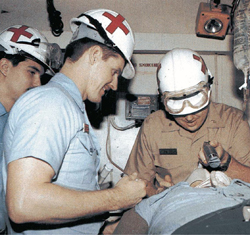 |
| Evaluating a Patient in the flight deck BDS on board the USS Nimitz CVN-68 |
"DOC." To have earned their trust, to take care of them when they were ill, depressed, angry, injured, alone; to be available in friendship and counsel, to cry or hold their hand in times of worry and to see them excel in their career and family matters, and yes, to watch them pass from this world to the next, was as if they were my family. They were my responsibility. Over a span of twenty years, I held onto every moment as if were my last. The military was my rock, my foundation, my structure, my educator, and my family. Because of the military, as corny as it may sound, I learned about patriotism, honor, commitment and courage. So, my one achievement is that I served my time with honor as a United States Navy Corpsman.
OF ALL THE MEDALS, AWARDS, FORMAL PRESENTATIONS AND QUALIFICATION BADGES YOU RECEIVED, OR ANY OTHER MEMORABILIA, PLEASE DESCRIBE THOSE WHICH ARE THE MOST MEANINGFUL TO YOU AND WHY?
 |
| Navy & Marine Corp Commendation Medal |
Probably my last Navy Achievement because it summed up the culmination of 20 years of service. More than anything I retired HONORABLY. Although I could not seem to make Chief I did retire with GOLD instead of red stripes.To me this means that I followed the orders of those appointed over me for 20 years. I did what I was told to do. I performed admirably and I led by positive example, although many decisions and choices I did not favor or approve of. Regardless, I carried out the orders!
WHICH INDIVIDUAL(S) FROM YOUR TIME IN THE MILITARY STAND OUT AS HAVING THE MOST POSITIVE IMPACT ON YOU AND WHY?
I cannot narrow this to one person, so it has to be two. One is: Dr. John Foster, III of who I mentioned earlier. Two is: Henry Fox Casey, II aka "Casey" to me. I met Casey when I was an E3 and he was an E5 (HM2) at Naval
 |
| (L) Henry F. Casey & Me at BUDS training in California |
Regional Medical Center, Portsmouth, VA. He exemplified all of my expectations as a military leader and motivator. He led me to work in the hospital's Emergency Room because this is where the action was. I was either going to succeed or fail here. I chose to excel. Casey and I became close friends plus I taught him martial arts for a short time. Later he wanted us to try out for BUDS. Even if I didn't this was his goal.
Well, we trained and prepared ourselves and we made into basic training. Right before hell week I had to get a bunch of sand washed from my eyes which due to a prior history with my vision the SEAL Team physician medically discharged me from BUDS. Casey was also placed on hold due to a knee injury, however he returned and completed BUDS. I went haze gray and underway on the USS Nimitz of where I excelled and Casey went through the ranks as a SEAL Master Chief and then crossed over to the officer ranks and became a SEAL Physician. Truly a remarkable, patriotic, military officer, family man, and a great role model for others to emulate. Although we have gone our separate ways I am glad and without hesitation and reservation to say, "Thank you Officer Casey and friend for being an inspiration in my life." Very respectfully - Steve. The attached photo is me (right), Casey (left) at his father's home in California while attending BUDS. Oh, for those of you who do not know what BUDS is, it stands for Basic Underwater Demolition Seals.
CAN YOU RECOUNT A PARTICULAR INCIDENT FROM YOUR SERVICE WHICH MAY OR MAY NOT HAVE BEEN FUNNY AT THE TIME, BUT STILL MAKES YOU LAUGH?
Not at the moment, which is pathetic now that you asked the question. Although I had some great times I cannot think of anything that was that "funny" that would stand out today. Okay, guess I need to re-enlist and start over!!
WHAT PROFESSION DID YOU FOLLOW AFTER YOUR MILITARY SERVICE AND WHAT ARE YOU DOING NOW? IF YOU ARE CURRENTLY SERVING, WHAT IS YOUR PRESENT OCCUPATIONAL SPECIALTY?
This is a loaded question because retiring from Yokosuka, Japan was not an easy transition; Especially after living there for seven years. Moving back to the U.S. almost felt like returning to a foreign country. Everything looked so large! It truly felt like my wife and I were starting our life as if we were in our adolescent years. All of the years I was trained in Navy medicine and earning my B.S. degree in Health Care Management, I could not even land a job at a Navy hospital. So, my next door neighbor was a Warden for a prison and he pulled some strings and after training I became a Corrections Officer. Climbing the corporate ladder my career path starting returning me to the hospital community. I held positions such as, U.S. field investigator conducting security background investigations, hospital safety & security manager, emergency preparedness coordinator, hazardous materials awareness and response facilitator, public health bio-terrorism emergency planning manager, emergency management planning analyst, and a hospital housekeeping contract senior project manager. Currently, I am a GS-12, Step 10 Government employee at Walter Reed National Military Medical Center (WRNMMC). My title is Hospital Housekeeping Officer, which simply means that I ensure that the contracts who perform housekeeping services for the hospital are delivered as per contract specifications. I oversee approximately 320 staff. Collateral duties include conducting inspections revolving around The Joint Commission's environment of care programs, as well as represent as the Division's Safety Officer.
WHAT MILITARY ASSOCIATIONS ARE YOU A MEMBER OF, IF ANY? WHAT SPECIFIC BENEFITS DO YOU DERIVE FROM YOUR MEMBERSHIPS?
American Legion, Navy IDC Association, American Military Retirees Association, Disabled American Veterans, American Association of Hospital Corpsman, National Association of Medics and Corpsman, Wounded Warriors Project. Benefits: Mostly to stay atop of current communications in the above communities of interest; Charity/Donations.
IN WHAT WAYS HAS SERVING IN THE MILITARY INFLUENCED THE WAY YOU HAVE APPROACHED YOUR LIFE AND YOUR CAREER?
Another loaded question. I ran away from home when I was about 12 years old and never returned home. A story for another time. I enlisted when when I was 23 years old. From that moment the Navy defined who I was at that moment. It became my life, my
 |
| Me at BUDS in Coronado and My Son Matthew |
father, my mother, my family. It provided me safety, structure, warmth, shelter, food, clothing, pay, benefits, and all the tools I needed to succeed in life. All I had to do was simply to pull my weight and do what those appointed over me wanted. The Navy provided me an education on life's experiences, academia, ways of life in other countries and ethnic cultures, diversity, and teamwork.
It enhanced my patriotism, devotion to service, duty, honor, and love for my country. By traveling around the world the Navy exposed me to other countries and their way of life but after returning home the Navy showed me just how good and how broad the opportunities were/are in the USA. It made me proud to be an American but the military also taught me that there is a need for us to be involved in the protection of others who could not defend or protect themselves. That we are a great nation because of what and how we give back to the world.
The Navy taught me that service to our country is an honorable way of life. My great, great, great grandfather was a Sergeant in the War Between the States, AKA the Civil War. My father enlisted in the Army and served in the Korean and Vietnam Wars, I served for twenty years, and my son has been serving with the Marine Special Forces Unit for the past ten years. He has deployed to Afghanistan / Iraq on multiple occasions. Hopefully you can feel our devotion and compassion for duty, honor, and service to the USA. The Navy and military defined who I am today. I know it sounds like a cliche but it taught me to be all that I can be. Someone with a purpose and who could positively contribute to society. I used to work for a Navy Captain Medical Officer; Dr. George M. Stone, II, USN-RET. Because of the Navy and this man/officer,
I married his daughter and now I have the most wonderful wife a husband could ever ask for. Post military has been somewhat difficult because of the known structures and stabilities have disappeared. Most companies cannot equate the skills and abilities we have to offer in today's workforce. The military chain-of-command understanding does not exist therefore trying to get a job done in a timely manner, with less manpower, limited tools, and on a severely restricted budget leaves an employee feeling less satisfied. That being said, the military taught me how to be flexible, resourceful, and to overcome obstacles, yet still produce positive end results. The attached photo is me (left) when I was enrolled in BUDS. My son Matt is currently serving with the U.S. Marines.
BASED ON YOUR OWN EXPERIENCES, WHAT ADVICE WOULD YOU GIVE TO THOSE WHO HAVE RECENTLY JOINED THE NAVY?
 |
| Retirement Ceremony Yokosuka, Japan |
Serve with dignity, honor, courage, and with the utmost character and integrity. Take in every opportunity provided to you. Give back and contribute all you can. Speak up but do so with respect and integrity. Follow the orders of those appointed over you. Advance in a higher education that will prepare you for retirement. Serve as a non-commissioned officer or an officer. No matter, just serve. See the world. Collect photographs. Make friends. Hold onto the memories. Serve at least one enlistment or make it a retirement. If one decides to make the service a career there is a great feeling of satisfaction that comes with holding the retiree military ID card in your hands and to drive up to a military facility, show your ID and the guards simply waive you through their gates. Once you serve, no one can ever take that from you. It shows your family, your community, employees, and employers that you understand commitment for a cause of something greater than yourself!
IN WHAT WAYS HAS TOGETHERWESERVED.COM HELPED YOU REMEMBER YOUR MILITARY SERVICE AND THE FRIENDS YOU SERVED WITH.
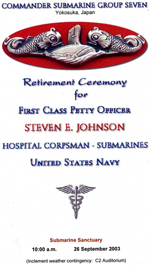 |
| Retirement Ceremony Agenda |
It has provided me a forum to associate with those who are like-minded. We all understand the role of military and what it means and takes to serve for a greater cause. TWS gives us opportunities like now, to share our thoughts, our memories, our photos, our experiences, and our wisdom gained through services and life's experiences. It has been a tool for me to find former shipmates I had lost contact with plus TWS has provided me information or access to other forums and/or tools I did not know existed. There is always something new popping up in TWS. TWS has piggy-backed and enhanced the military communications media outlets. A great service to all military affiliates! Thank you.
Doc out!
|
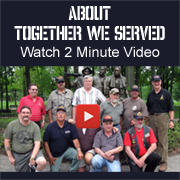

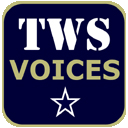
Read Other Interviews in the TWS Voices Archive
|
|
Share this Voices Edition on:


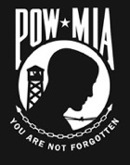  |
|
TWS VOICES
TWS Voices are the personal stories of men and women who served in the US Military and convey how serving their Country has made a positive impact on their lives. If you would like to participate in a future edition of Voices, or know someone who might be interested, please contact TWS Voices HERE.
This edition of Navy Voices was supported by:

Navy.Togetherweserved.com
For current and former serving Members of the United States Navy, TogetherWeServed is a unique, feature-rich resource enabling Naval personnel to re-connect with lost Shipmates, share memories and tell their Navy story.
To join Navy.Togetherweserved.com, please click HERE.
| |